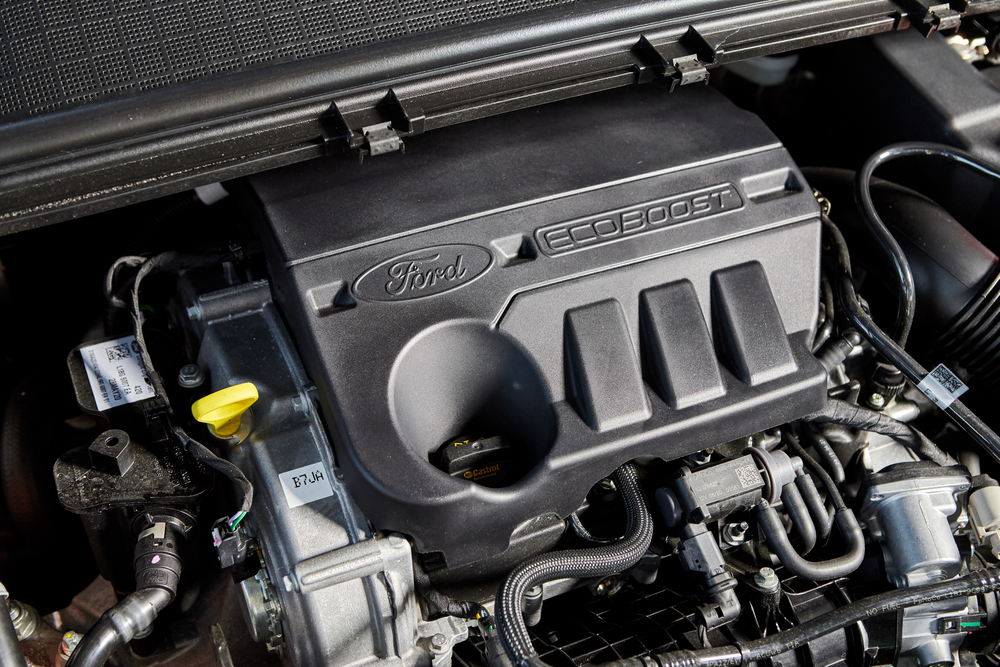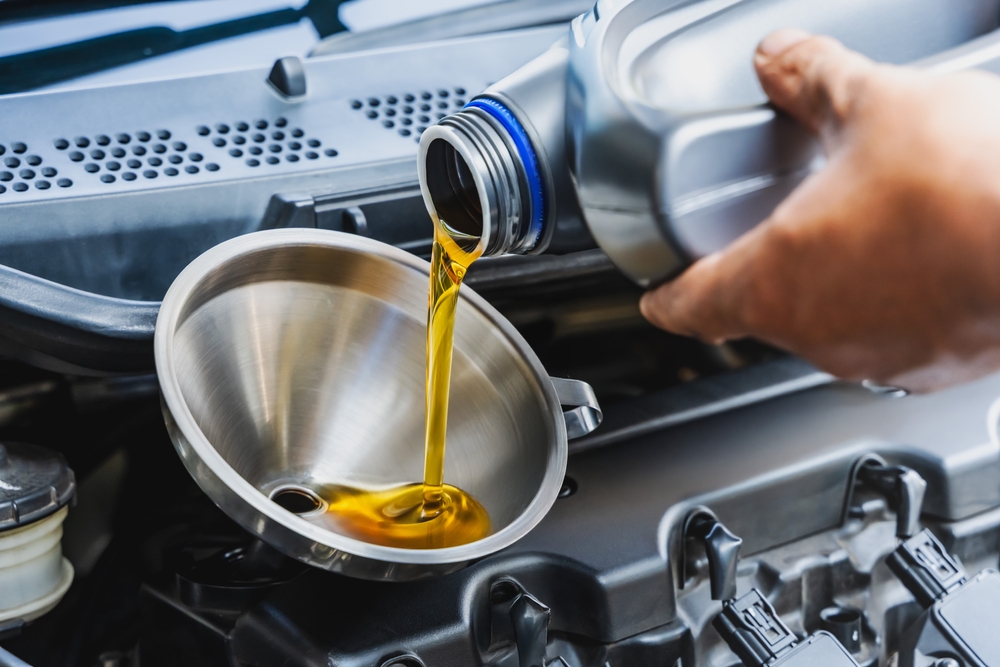Your Ford EcoBoost engine is a masterpiece of modern engineering—combining turbocharger power with impressive fuel economy in a compact, efficient package. But here’s the reality: this sophisticated engine has specific needs that generic quick-lube shops simply aren’t equipped to handle properly. If you’re driving through Murfreesboro’s hot, humid summers or dealing with stop-and-go traffic along Memorial Boulevard, your EcoBoost is working harder than you might think. The good news? With the right care from Ford of Murfreesboro Service Center, you can protect your investment and keep that turbocharged performance running strong for years to come.
Is Your Ford EcoBoost Getting the Right Oil? Why It’s Non-Negotiable
Let’s talk about something that actually matters to your EcoBoost’s longevity: oil. Not just any oil—the *right* oil. Your turbocharged engine operates at significantly higher temperatures and pressures than a traditional engine, which means the oil you use isn’t just important, it’s absolutely critical. Ford specifies synthetic or synthetic blend oils meeting strict standards like WSS-M2C946-A for most EcoBoost engines, and for good reason. These oils maintain their protective properties even when your turbo is spinning at over 100,000 RPM and generating extreme heat. Using conventional oil or the wrong viscosity grade—even if it’s cheaper—can lead to oil breakdown, increased wear, and eventually expensive turbo or engine damage.
Here’s what frequently happens in Murfreesboro’s summer heat: When temperatures climb into the high 80s and low 90s with humidity levels above 70%, your engine oil works overtime to protect internal components. Generic oils simply can’t handle the thermal stress of turbocharged operation in these conditions. That’s precisely why our technicians use Ford-certified oil change services with Motorcraft oils specifically formulated for EcoBoost engines. These oils include advanced additives that resist thermal breakdown and prevent the oil coking (baking onto hot turbo components) that commonly affects turbocharged engines. Think of it this way: cutting corners on oil is like fueling a racehorse with cheap feed—you’ll eventually pay a much higher price than what you saved.
Turbocharger 101: Simple Habits to Protect Your EcoBoost’s Power
Your turbocharger is essentially a tiny turbine that forces more air into your engine, creating that addictive burst of power when you accelerate onto I-24 toward Nashville. But turbos are also delicate, precision-engineered components that demand respect. One of the biggest mistakes EcoBoost owners make is shutting off the engine immediately after hard driving—like after merging onto the highway or climbing the hills around Rutherford County. When you do this, you’re cutting off oil flow while the turbo is still spinning at incredibly high speeds and temperatures, which can cause oil to cook onto the bearings and gradually destroy them.
The fix is remarkably simple: After driving hard or towing, let your engine idle for just 30 to 60 seconds before shutting it down. This brief cooldown period allows oil to continue circulating through the turbo, carrying away heat and protecting the bearings. It’s also essential to use the correct oil viscosity—typically 5W-30 for most EcoBoost engines—because thicker oil struggles to reach the turbo quickly during cold starts, while thinner oil won’t provide adequate protection at high temperatures. Tennessee’s temperature swings between cold winter mornings and sweltering summer afternoons make this balance even more important. Our factory-trained technicians understand these nuances and will always use the manufacturer’s recommended grade of motor oil, ensuring your turbo gets the protection it desperately needs during both startup and shutdown.
3 Common EcoBoost Issues and How to Prevent Them
Direct-injection technology is part of what makes your EcoBoost so efficient, but it also creates a specific maintenance challenge: **carbon buildup on intake valves**. Unlike traditional port-injection engines where fuel washes over the valves (keeping them clean), direct injection sprays fuel directly into the combustion chamber. This means the valves never get that cleansing fuel bath, and over time, oil vapor from the positive crankcase ventilation system bakes onto the hot valve surfaces, forming stubborn carbon deposits. Left unchecked, this buildup can cause rough idling, hesitation during acceleration, and reduced fuel economy—symptoms that creep up gradually between 40,000 and 80,000 miles.
The second common issue is **oil coking in the turbocharger**. When you shut off your engine immediately after hard driving (as discussed earlier), residual oil in the turbo literally cooks, forming hard carbon deposits that restrict oil flow and eventually lead to turbo failure—a repair that can easily cost thousands. Finally, many EcoBoost owners unknowingly contribute to **fuel dilution** of their engine oil. This happens when small amounts of unburned fuel wash past the piston rings and contaminate the oil, thinning it and reducing its protective capabilities. Short trips around Murfreesboro where the engine never reaches full operating temperature, combined with frequent cold starts, make fuel dilution worse.
Here’s how you prevent these problems: Use genuine Ford Motorcraft parts and high-quality synthetic oil, changed at appropriate intervals (typically every 5,000-7,500 miles for EcoBoost engines, not the extended 10,000-mile intervals some people attempt). Allow proper cooldown time after highway driving. And critically, bring your EcoBoost to technicians who actually understand these engines—not generic shops that treat every vehicle the same. Our team stays current on Ford’s latest service bulletins and uses Ford-approved cleaning methods when carbon buildup needs addressing, ensuring your engine gets the specialized care it requires without the risk of damaging sensitive turbocharger components with incorrect procedures.
| EcoBoost Issue | Common Symptoms | Primary Causes | Prevention Strategy |
|---|---|---|---|
| Carbon Buildup on Intake Valves | Rough idle, hesitation, reduced power, lower MPG | Direct injection design, oil vapor from PCV system, short trips | Use quality synthetic oil, occasional highway driving, professional cleaning when needed |
| Turbocharger Oil Coking | Turbo whine, oil consumption, eventual turbo failure, blue smoke | Immediate shutdown after hard driving, wrong oil type, infrequent oil changes | 30-60 second cooldown period, synthetic oil, 5,000-7,500 mile oil changes |
| Fuel Dilution in Oil | Oil smells like gas, thin consistency, reduced lubrication protection | Frequent short trips, cold starts, engine not reaching operating temperature | Longer drives to warm engine fully, regular oil changes, quality synthetic oil |
Note: Symptoms may vary by EcoBoost engine variant. Consult Ford of Murfreesboro for engine-specific recommendations.
Maximize Your MPG: Fuel Efficiency Tips for Murfreesboro Drivers
One of the main reasons you chose an EcoBoost was probably fuel economy—getting V6 or V8 power from a smaller, more efficient engine. But here’s what most people don’t realize: EcoBoost engines are incredibly sensitive to maintenance and driving habits when it comes to achieving their advertised fuel economy numbers. If you’ve noticed your MPG dropping, there’s usually a specific, fixable reason. Dirty air filters restrict airflow, forcing the engine to work harder and burn more fuel. Underinflated tires create rolling resistance that can reduce fuel economy by several MPG—especially problematic during Murfreesboro’s temperature swings when tire pressure naturally fluctuates. And carbon buildup on those intake valves we discussed earlier? It disrupts the precise air-fuel mixture your EcoBoost needs for optimal efficiency.
Here are some practical steps to maintain peak fuel economy: First, stay on top of proper tire maintenance, checking pressure monthly and keeping tires inflated to the specification listed on your driver’s door jamb (not the maximum pressure stamped on the tire sidewall). Second, replace your engine air filter at recommended intervals—typically every 15,000-30,000 miles depending on driving conditions. If you frequently drive on dusty rural roads around Rutherford County, err on the shorter interval. Third, address any check engine lights immediately, as even seemingly minor issues like a faulty oxygen sensor can significantly reduce fuel economy. And fourth, avoid aggressive acceleration and excessive idling—both are especially wasteful with turbocharged engines that burn rich during hard acceleration and don’t shut off fuel flow during extended idle periods like naturally aspirated engines can.
There’s also the fuel quality factor. Using Top Tier gasoline from reputable stations provides enhanced detergent additives that help keep fuel injectors clean and operating at peak efficiency. While EcoBoost engines don’t typically require premium fuel, using it occasionally—especially before long highway trips—can help the engine run more efficiently and provide a small MPG boost. For more comprehensive guidance on maintaining efficiency, the official fuel-saving tips from FuelEconomy.gov offer excellent strategies that complement proper EcoBoost maintenance. The bottom line: A well-maintained EcoBoost can easily deliver its rated fuel economy or better, but achieving those numbers requires attention to the details that generic service centers typically overlook.
Why Trust Ford of Murfreesboro With Your EcoBoost Service
Here’s the fundamental difference between our service center and the competition: we don’t just change oil and check boxes on a generic service list. We understand EcoBoost engines because we work on them every single day, stay updated on Ford’s latest technical service bulletins, and have access to specialized diagnostic equipment that generic shops simply don’t possess. When you bring your F-150, Escape, Explorer, Edge, or any other EcoBoost-equipped Ford to our facility, our technicians know the exact oil specification your specific engine requires—not just “5W-30,” but whether it needs to meet WSS-M2C946-A, WSS-M2C961-A1, or another Ford specification. This level of precision matters tremendously for long-term engine health.
We also understand the unique demands of driving in Middle Tennessee. The combination of hot, humid summers where temperatures regularly exceed 90°F, occasional winter cold snaps, and the stop-and-go traffic patterns on roads like Old Fort Parkway all impact your EcoBoost differently than highway cruising in moderate climates. Our maintenance recommendations reflect these real-world conditions. Additionally, we use genuine Ford Motorcraft parts and fluids specifically engineered for your vehicle, not universal “one-size-fits-all” alternatives. When your cooling system maintenance is due, we’re using the exact coolant formulation Ford engineers specified for your EcoBoost’s aluminum engine components, ensuring compatibility and maximum protection.
Perhaps most importantly, we stand behind our work with confidence because we’re following Ford’s exact service procedures and using approved parts. If something does go wrong, you have the peace of mind that comes from dealer service records, which are invaluable for warranty claims and resale value. Independent shops might save you a few dollars upfront, but when you’re dealing with a sophisticated, turbocharged, direct-injection engine, the expertise and proper parts matter far more than the lowest price. Check out our current service specials to see how affordable proper EcoBoost care can actually be when you choose a service center that values your business and your vehicle’s longevity. For added convenience, we also offer flexible service options to fit your busy schedule around Murfreesboro.
Frequently Asked Questions (FAQs)
Q: How often should I really change the oil in my Ford EcoBoost?
A: While Ford’s oil life monitoring system may suggest changes up to 10,000 miles, most EcoBoost owners benefit from more frequent changes—typically every 5,000-7,500 miles. Turbocharged engines operate under higher thermal stress, and shorter intervals help prevent oil coking in the turbo and address fuel dilution issues common with direct-injection engines. If you do mostly short trips around Murfreesboro or frequently tow, stay closer to the 5,000-mile interval using quality synthetic oil.
Q: Do I have to use synthetic oil in my EcoBoost engine?
A: Yes, absolutely. Ford specifies synthetic or synthetic blend oils meeting specific performance standards like WSS-M2C946-A or WSS-M2C961-A1 depending on your engine. These oils are formulated to withstand the extreme temperatures and pressures inside turbocharged engines. Using conventional oil—even if it’s the correct viscosity—won’t provide adequate protection and can lead to accelerated wear and turbo damage. The slightly higher cost of synthetic oil is excellent insurance against much more expensive repairs down the road.
Q: Why does my EcoBoost engine hesitate or shudder?
A: Hesitation or shuddering typically indicates one of several issues: carbon buildup on intake valves restricting airflow, fouled spark plugs, clogged fuel injectors, or a failing ignition coil. Because EcoBoost engines use direct injection, carbon deposits accumulate over time on valve surfaces, disrupting the precise air-fuel mixture the engine needs. If you’re experiencing these symptoms, bring your vehicle to our service center for proper diagnosis. We’ll identify the exact cause and use Ford-approved methods to resolve it without risking damage to sensitive turbocharger components.
Q: How can I prevent carbon buildup in my direct-injection engine?
A: While you can’t completely eliminate carbon buildup in direct-injection engines, you can significantly slow its progression. Use Top Tier gasoline with enhanced detergent additives, change your oil regularly with high-quality synthetic oil, and occasionally take your vehicle on longer highway drives where the engine reaches full operating temperature. Some owners also benefit from periodic fuel system treatments, though these should be Ford-approved products. When buildup does occur, professional cleaning using methods like walnut blasting safely removes deposits without harming the engine—never attempt chemical induction services on turbocharged EcoBoost engines as they can damage the turbo.
Q: Do I really need to let my turbo engine idle before turning it off?
A: Yes, but only after extended highway driving, towing, or spirited driving where the turbo has been working hard. If you’ve just been cruising around Murfreesboro at moderate speeds, immediate shutdown is fine. However, after pushing your EcoBoost—like after climbing hills or merging onto I-24—let it idle for 30-60 seconds. This brief cooldown allows oil to continue circulating through the turbo, carrying away heat and preventing oil from cooking onto the bearings. Think of it as a simple habit that can save you thousands in turbo replacement costs later.
Schedule Your Expert EcoBoost Service Today
Your Ford EcoBoost is a precision-engineered powerhouse that deserves care from technicians who truly understand its sophisticated turbocharged, direct-injection design. The factory-trained experts at Ford of Murfreesboro have the specialized diagnostic equipment, genuine Motorcraft parts, and up-to-date technical knowledge to keep your EcoBoost running strong for years to come. Whether you drive an F-150, Escape, Explorer, Edge, or any other EcoBoost-equipped Ford, we follow Ford’s exact service procedures to protect your investment and maximize performance.
With Murfreesboro’s hot, humid summers where temperatures regularly climb into the high 80s and low 90s, and stop-and-go traffic along Memorial Boulevard and Old Fort Parkway putting extra stress on your turbo, proper maintenance isn’t optional—it’s essential. Don’t trust your sophisticated engine to generic quick-lube shops that use whatever oil is cheapest or skip the critical cooling period your turbo needs. Our comprehensive approach addresses the specific needs of EcoBoost engines, from using the correct synthetic oil specifications to preventing carbon buildup and protecting your turbocharger from premature failure.
Or visit us at Ford of Murfreesboro Service Center at 1550 NW Broad Street, Murfreesboro, TN, 37129, where our team is ready to answer your questions and provide the specialized EcoBoost care your vehicle truly deserves.





